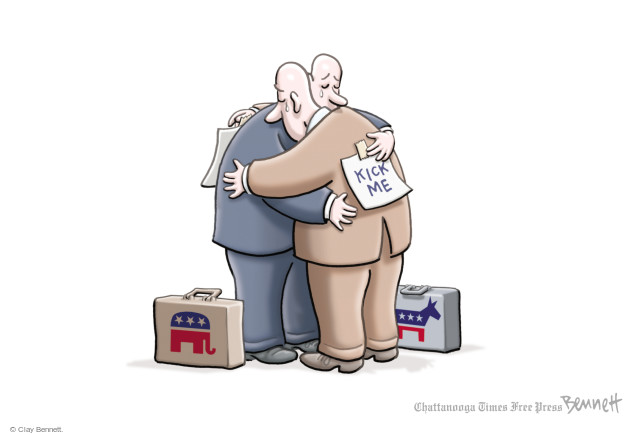New York Senator Chuck Schumer: “The time has finally come for our Republican colleagues to take us up on our offer of working together to improve the healthcare system rather than sabotage it,” the New York Democrat told reporters. “We Democrats have held the door to bipartisanship open to our Republican colleagues for months,” he said. “It’s time for the Republicans to walk through it.”
What is Bipartisanship?
“Bipartisanship is a political situation, especially in the context of a two-party system, as is the case for countries such as the United States and other western countries, in which opposing political parties find common ground through compromise. This is in contrast to partisanship, where an individual or political party only adheres to their interests without compromise. It has been debated among political theorists however that in practice, each party advances their own political agenda at the expense of the other party because of the conflicting ideologies.”
That word has been constantly bandied around Washington for years. We all hear it almost daily in the context of political issues. As the definition above clearly states, the process of Bipartisanship describes it as “…a political situation in which opposing political parties find common ground through compromise.” When oh when is the last time you saw ANY legislation, legislative proposal, heard any legislative debate or seen any talk show with political pundits who find ANY compromise on ANY political pending legislation or ANY ways to through compromise find consensus? To be honest, the only times in my lifetime I can remember any real bipartisanship was what I vaguely remember from the early 60’s when Lyndon Johnson could not get the Civil Rights Act passed in a Democrat controlled Congress, so reached across the aisle to the Republicans. (As a factual matter, far more Republicans voted for the eventual law than did Democrats!) The other noticeable bipartisan legislation in my memory is when Ronald Reagan worked closely with the Democrat controlled Congress and then House Speaker Tip O’Neil to achieve those historical tax cuts in the 90’s. As far as I know, other than those two, I can’t say there have been any significant bipartisan compromises on Capitol Hill.
Let’s face it: there is NO bipartisanship in Washington D.C., and though we hear token mentions of it by members of both parties and the White House, bipartisanship is nothing more than a pipe-dream proffered to voters every 4 years or so by candidates for D.C. office. American voters continually swallow the “bipartisanship pill” and in many cases make voting decisions based on those promises of bipartisanship.
Who’s to Blame?
Honestly, I don’t think the hypocritical mantra about promised bipartisanship is exclusive to either political party. Unfortunately for Americans, it seems that its lack in our political system is simply the result of the all-consuming quest by most of those in both parties for POWER — that’s what drives the D.C. ship. It’s a simple thought process for politicians: voters want to feel good about voting for someone that promises to, if elected, go to Washington and work with anyone and everyone necessary to get whatever legislation passed those particular voters want passed. It’s similar to the young man who is driven to get to second base with the current “girl of his dreams” on a date. He’ll say just about anything to get that chance.
Honestly, Bipartisanship is really nothing more than a utopian dream concocted by a political class a hundred years or so ago in America who were seeking to find a way to con voters for their votes. It rarely ever enters a political debate at a substantive level. Even if/when members of either the Democrat or Republican party talk about bipartisanship, it is nothing more than a talking point. They all know in its genuine form of true compromise, it does not exist today.
How Do We Get Anything Done?
Honestly, I think for the foreseeable future at least, substantive legislation from Capitol Hill is going to be tough to turn into law. Why? Pretty much all proposed legislation today is based totally on political expediency as defined by the proposer(s) of each piece of legislation. Let’s face it: all 535 of them and every member of the presidential administration have personal agendas. Their legislation is molded to fit each of those agendas and is NOT crafted on the most part to assist Americans in their daily lives — UNLESS what Americans are looking for in that legislation parallels the wishes of those legislators. That’s really sad…but it’s really true.
The fundamental and default position regarding legislation in the minds of those folks is NOT about bipartisanship — no matter what promises were made to get elected. And President Obama was the chief offender. When campaigning before the 2008 election, he was all about bipartisanship and in rallies and speeches almost daily threw rocks at those in Congress for not adopting the principles of bipartisanship. Remember what I said above: they’ll make all sorts of bipartisanship promises when they feel voters want to hear them. But when the “rubber meets the road” — that’s AFTER they’re elected — things seem to always change:
President Barack Obama: (he said the following in a White House meeting with Republicans in legislative negotiations in 2010) “Elections have consequences,” he told then number two Republican Rep. Eric Cantor. “And at the end of the day, I won. So I think on that one I trump you.”
Former Secretary of State Colin Powell: “The only bipartisanship you ever see is when they finally sign a bill and everybody says, ‘Gee, isn’t that wonderful?'”
Summary
For those who hold hope for bipartisanship in Congress and elsewhere in Washington, D.C., I think your disappointment will continue. The only time you have seen in the past and will see in the future (at least in this political environment) bipartisanship is when BOTH parties want the same things in particular pieces of legislation. Besides that, as President Obama so succinctly put it, “elections have consequences.” In other words, the Party in control is probably going to pretty much have its way when it comes to passing legislation. That applies not only to laws, but to regulations, court appointments, cabinet nominations, and even Congressional legislative rules and processes. For those reasons, Americans need to become more astute as to all things happening in Washington and who is doing what. Actions are more critical now than ever. Ignore the mantra of the Left and Right when you hear or see it. Weigh through it all to get facts.
I suggest at election time both for federal, state, and local officials, we all carefully examine the credentials of each candidate, the policies of each candidate, the history of each, (especially of those who have previously served in a political position) and make educated decisions about how to vote. In my opinion it is literally un-American for any voter to walk into a voting booth and not know the particular candidates or issues to be voted on. We must know what we are doing when we pull those levers.
Listen, listen. listen. That is often hard to do because there is so much noise on the political stage for us to wade through. But Americans are not stupid: we have awesome discernment abilities. (In the South it’s called a “bull—t” meter) We all need to educate ourselves on issues, then watch and listen and learn from doing so. Then let discernment takeover when it’s time to make decisions.
Oh, be careful about decisions you make based on what you hear and see these people below when they talk to you. They’re all 4 not only Senators and Congress members, they’re politicians. “Know how to tell when politicians are lying? Their mouths are moving.” (The only time they acted in a bipartisan manner was when they stood to clap at the Congressional baseball game, pictured here)


